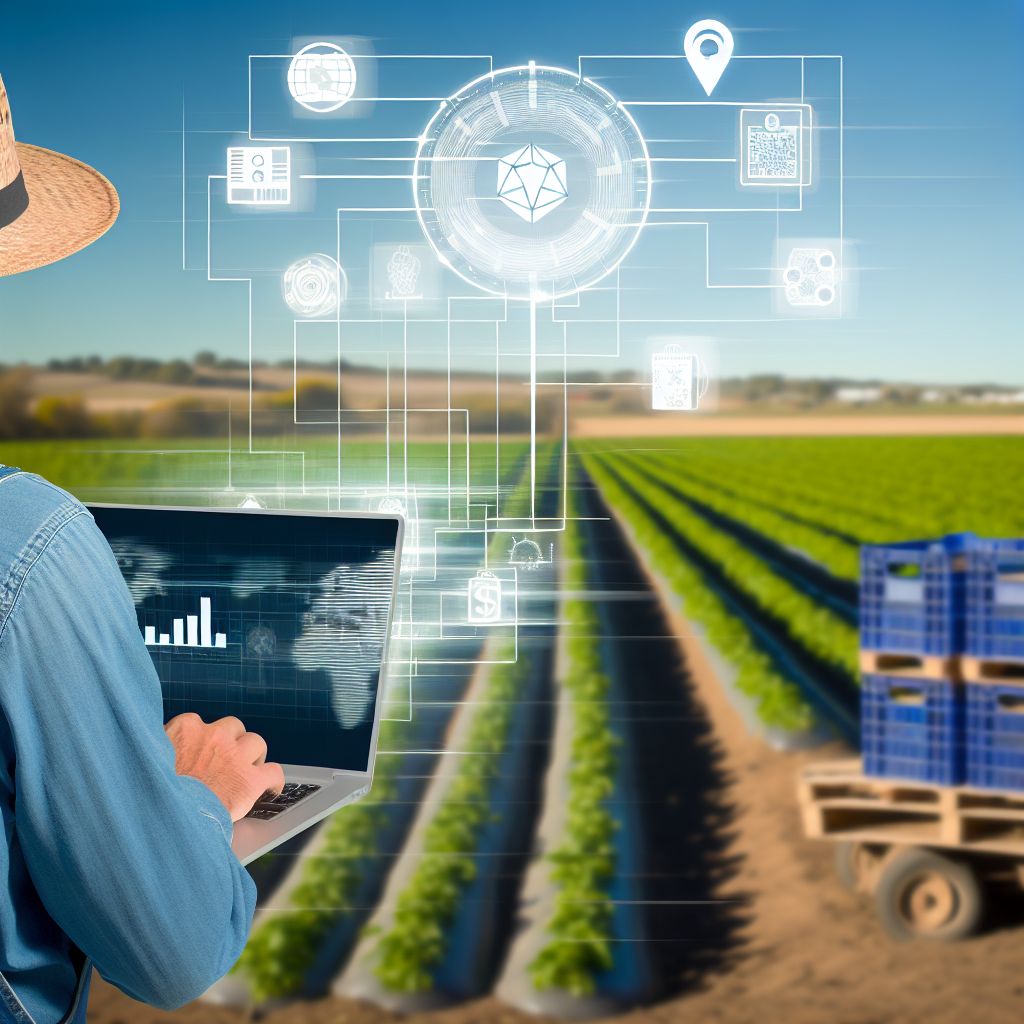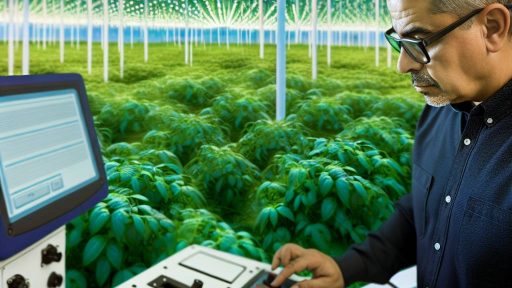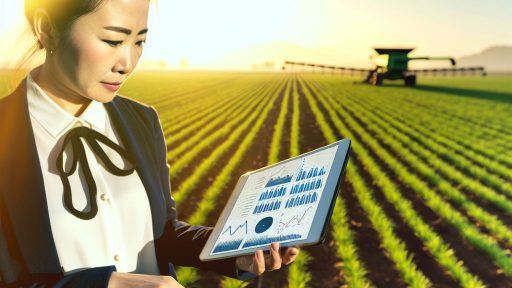Introduction to Blockchain Technology and Agriculture
Blockchain technology represents a significant advancement in data management.
This decentralized technology enhances transparency across various industries.
In agriculture, it offers various solutions for farmers and supply chains.
It enables secure data transactions that can improve efficiency.
Understanding Blockchain Basics
Blockchain consists of interconnected blocks of data.
Each block contains transaction records that are immutable.
Once recorded, the information cannot be altered.
This ensures that data integrity is maintained.
Moreover, the decentralized nature fosters trust among stakeholders.
Benefits for Farmers
Farmers can significantly reduce fraud through blockchain technology.
By recording products on the blockchain, they establish authenticity.
This establishes trust with consumers and supply chain partners.
Consequently, farmers can command fairer prices for their products.
Enhancing Supply Chain Management
Blockchain improves supply chain transparency dramatically.
Farmers can track their products from farm to consumer.
Transform Your Agribusiness
Unlock your farm's potential with expert advice tailored to your needs. Get actionable steps that drive real results.
Get StartedThis ensures compliance with regulations and improves accountability.
Additionally, it helps identify inefficiencies within the supply chain.
Traceability and Food Safety
Traceability is a crucial aspect of food safety.
Blockchain enables detailed tracking of food products.
In case of contamination, the source can be quickly identified.
Thus, quick action can be taken to minimize health risks.
Collaboration Opportunities
Farmers can collaborate more efficiently with distributors and retailers.
Shared data enhances decision-making in the supply chain.
Smart contracts automate transactions once conditions are met.
This reduces delays and ensures timely payments.
Overview of Supply Chain Challenges Faced by Farmers
Complexity of Supply Chains
Farmers often navigate complex supply chains to bring products to market.
Each link in the chain adds layers of complexity.
From production to distribution, inefficiencies can arise at any stage.
Price Volatility
Farmers experience frequent price fluctuations for their products.
Market demand and supply chain disruptions contribute to this volatility.
As a result, farmers struggle to predict revenue accurately.
Information Asymmetry
Many farmers lack access to crucial market information.
This information gap makes it difficult to make informed decisions.
Consequently, farmers may miss out on better prices for their goods.
Traceability Issues
Traceability remains a significant concern for farmers and consumers.
Identifying the source of food products is often challenging.
This lack of transparency can erode consumer trust.
Storage and Transportation Challenges
Farmers face logistical hurdles related to storage and transportation.
Temperature-sensitive products require special handling throughout logistics.
Showcase Your Farming Business
Publish your professional farming services profile on our blog for a one-time fee of $200 and reach a dedicated audience of farmers and agribusiness owners.
Publish Your ProfileAdditionally, infrastructure limitations can further complicate distribution.
Dependency on Intermediaries
Farmers often rely heavily on intermediaries in the supply chain.
This dependency reduces their profit margins significantly.
Moreover, intermediaries may not always act in the farmer’s best interest.
How Blockchain Enhances Traceability in Agricultural Supply Chains
The Importance of Traceability
Traceability is vital in agricultural supply chains.
It helps farmers ensure product quality and safety.
Moreover, traceability builds consumer trust.
Consumers increasingly demand transparency in food sourcing.
Blockchain as a Solution
Blockchain technology provides a reliable solution for traceability.
This technology creates an immutable record of transactions.
Every step of the supply chain becomes easily accessible.
Farmers can verify the origin of their products effortlessly.
Enhancing Visibility and Transparency
Blockchain enhances visibility for all supply chain participants.
Everyone from farmers to retailers can access data.
This access fosters open communication and collaboration.
As a result, inefficiencies can be identified and addressed promptly.
Breaking Down the Supply Chain
- Farmers register their produce on the blockchain.
- Processors record handling conditions and transformations.
- Distributors update shipping details and timelines.
- Retailers provide sales data and customer interactions.
Reducing Fraud and Contamination Risks
Blockchain technology helps mitigate fraud in the supply chain.
With immutable records, altering data is nearly impossible.
Farmers can track and verify each product’s journey.
This capability reduces contamination risks significantly.
Facilitating Compliance and Reporting
Regulatory compliance becomes easier with blockchain.
Farmers can quickly generate reports on their practices.
Transparency aids in adhering to food safety standards.
Consequently, compliance costs may decrease.
Building Consumer Confidence
Consumers appreciate knowing their food’s origin.
Blockchain provides this information transparently.
When consumers trust the product, loyalty increases.
This trust enhances brand reputation in the market.
Find Out More: Essential Agri-Fintech Tools That Every Modern Farmer Should Use
Reducing Fraud and Ensuring Authenticity with Blockchain
The Impact of Fraud in Agriculture
Fraud in agriculture can lead to significant financial losses for farmers.
It undermines consumer trust and negatively affects market stability.
Fraudulent practices may involve mislabeling products or falsifying certifications.
These actions not only harm honest farmers but also threaten food safety.
Addressing this issue is crucial for maintaining integrity in the supply chain.
Blockchain as a Solution
Blockchain technology offers a potent solution to combat fraud.
It provides a secure, transparent way to track agricultural products.
Every transaction gets recorded in an immutable ledger.
This ensures all information remains verifiable and accessible to stakeholders.
With blockchain, farmers can demonstrate the authenticity of their products.
Ensuring Product Traceability
Traceability is one of blockchain’s most significant benefits.
Showcase Your Farming Business
Publish your professional farming services profile on our blog for a one-time fee of $200 and reach a dedicated audience of farmers and agribusiness owners.
Publish Your ProfileFarmers can trace their products from farm to table with ease.
This transparency builds consumer confidence in product quality.
Moreover, it allows for quick identification in the event of a food safety issue.
Consumers increasingly demand to know the origins of their food.
Enhancing Trust Among Stakeholders
Blockchain fosters trust among all parties involved in the supply chain.
Producers, distributors, and retailers can cooperate more effectively.
Available data minimizes disputes and enhances collaboration.
When all stakeholders have access to transparent information, confidence grows.
This trust ultimately leads to better business relationships and sustainability.
Real-World Applications of Blockchain
Several companies have already begun leveraging blockchain in agriculture.
AgriDigital, for example, tracks grain movements through a blockchain platform.
This ensures secure transactions and builds trust among grain buyers and sellers.
Similarly, Walmart uses blockchain to trace food products through its supply chain.
Such initiatives highlight the real potential of blockchain in reducing fraud.
Uncover the Details: Emerging Agri-Fintech Trends Every Farmer Should Embrace
Improving Payment Processes and Financial Transactions through Smart Contracts
Defining Smart Contracts
Smart contracts automate contract execution on the blockchain.
They function as digital agreements between parties.
These contracts self-execute based on predefined conditions.
This automation reduces the need for intermediaries.
Consequently, transactions become faster and more efficient.
Enhancing Payment Processes
Farmers can benefit from timely payments using smart contracts.
These contracts ensure immediate payment upon meeting contract terms.
For instance, when a delivery is confirmed, payment triggers automatically.
This immediacy helps farmers manage cash flow effectively.
Additionally, it minimizes payment disputes with buyers.
Streamlining Financial Transactions
Smart contracts simplify complex financial transactions.
Farmers can securely handle transactions without third parties.
This reduces the overall transaction costs significantly.
Moreover, it fosters trust between farmers and buyers.
Consequently, it helps build stronger business relationships.
Integrating with Supply Chain Management
Smart contracts seamlessly integrate with supply chain systems.
Farmers can track product movement from farm to store accurately.
This visibility enhances overall supply chain efficiency.
Furthermore, it ensures compliance with food safety regulations.
As a result, consumers gain confidence in agricultural products.
Expanding Market Access
Smart contracts open new markets for farmers.
They can connect directly with consumers through digital platforms.
This direct access increases competitive opportunities.
Additionally, farmers can leverage blockchain for transparent transactions.
This transparency attracts more buyers interested in ethical sourcing.
Showcase Your Farming Business
Publish your professional farming services profile on our blog for a one-time fee of $200 and reach a dedicated audience of farmers and agribusiness owners.
Publish Your ProfileDiscover More: Wind Turbines Installation Best Practices for Farms

The Role of Decentralized Platforms in Connecting Farmers with Consumers
Empowering Direct Transactions
Decentralized platforms enable farmers to connect directly with consumers.
This eliminates the need for intermediaries in the supply chain.
As a result, farmers receive a fairer price for their products.
Consumers also benefit from lower prices and fresher produce.
Enhancing Trust and Transparency
Blockchain technology enhances trust between farmers and consumers.
Each transaction is recorded on a secure, immutable ledger.
This transparency allows consumers to trace the origin of their food.
Consequently, it fosters confidence in product quality and safety.
Improving Data Accessibility
Decentralized platforms provide accessible data for all stakeholders.
Farmers can analyze market trends and consumer preferences.
Accessibility to real-time data enables better decision-making.
This data-driven approach enhances overall supply chain efficiency.
Facilitating Community Support
Decentralized platforms foster community support for farmers.
Consumers can engage in local buying initiatives through these platforms.
Such initiatives promote sustainable agricultural practices.
As a result, they contribute to local economies and food security.
Uncover the Details: How Agri-Fintech Solutions Are Revolutionizing Modern Farming Practices
Case Studies of Successful Blockchain Implementation in Agriculture
Improving Transparency with IBM Food Trust
IBM Food Trust successfully utilizes blockchain in the food supply chain.
This system enhances transparency from farm to table.
Farmers can track their products’ journey accurately.
In addition, retailers and consumers gain insight into sourcing.
This transparency boosts consumer confidence in food safety.
Reducing Waste with Ripe.io
Ripe.io is revolutionizing how agricultural data is shared.
It connects farmers with buyers using blockchain technology.
This platform reduces food waste by optimizing supply chains.
Farmers use data to make informed decisions about harvesting.
Consequently, this results in fresher produce for consumers.
Enhancing Fair Trade with TE-FOOD
TE-FOOD promotes fair trade through blockchain technology.
The platform provides a complete view of product journeys.
Farmers can verify that they receive fair prices for their goods.
Consumers benefit from knowing the origins of their food.
This approach fosters trust between consumers and producers.
Streamlining Payments with AgriDigital
AgriDigital simplifies payment processes in farming.
Using blockchain, it automates transactions between farmers and buyers.
This reduces transaction times significantly.
Farmers enjoy immediate payments upon delivery of goods.
Moreover, this system minimizes the risks of fraud.
Increasing Efficiency with FoodTrust
FoodTrust leverages blockchain to enhance efficiency in supply chains.
This system eliminates paperwork and increases speed.
Showcase Your Farming Business
Publish your professional farming services profile on our blog for a one-time fee of $200 and reach a dedicated audience of farmers and agribusiness owners.
Publish Your ProfileFarmers can access crucial data in real-time.
This feature helps them make timely decisions.
Ultimately, it leads to improved inventory management.
Boosting Quality Assurance with Provenance
Provenance uses blockchain to ensure quality assurance in products.
Consumers can trace products back to their source easily.
This creates a competitive edge for farmers.
High-quality standards are maintained throughout the supply chain.
Trust in food products increases, benefiting all parties involved.
Future Trends: The Potential of Blockchain in Sustainable Farming Practices
Enhancing Traceability
Blockchain technology significantly improves traceability in supply chains.
This allows consumers to verify the origin of their food.
Consequently, farmers can build trust with their customers.
A transparent supply chain enhances food safety standards.
Optimizing Resource Management
Blockchain can streamline resource management for farmers.
It enables real-time tracking of inputs like water and fertilizers.
Farmers can reduce waste and operate more efficiently.
Moreover, they can make data-driven decisions to optimize yields.
Reducing Fraud
Fraud in the food supply chain can harm farmers’ reputations.
Blockchain technology safeguards against fraudulent activities.
Smart contracts can automate compliance checks, minimizing human error.
Thus, farmers can protect their products and income more effectively.
Facilitating Access to Markets
Blockchain enhances access to new markets for farmers.
Farmers can connect directly with consumers, bypassing middlemen.
This increases their profit margins and market presence.
Utilizing blockchain can also open doors to international markets.
Supporting Sustainable Practices
Blockchain promotes sustainable farming methods through accountability.
This technology incentivizes eco-friendly practices among farmers.
Consumers increasingly prefer products that prioritize sustainability.
Therefore, farmers can enhance their marketability by adopting blockchain.
Additional Resources
Enhancing smart farming through the applications of Agriculture 4.0 …
Revolutionizing American Agriculture: How Farmonaut’s Precision …




